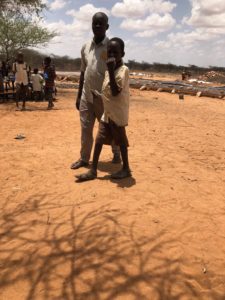 The Walking School Bus
The Walking School Bus
Ever heard of a walking school bus? Or trying to figure what it could look like? It might sound strange, but it is already happening at Kaloboi primary school in Turkana County, Kenya, thanks to CWS supported education program School Safe Zones (SSZ).
When you arrive at Kaloboi primary school early in the morning, you will notice groups of parents standing randomly talking to each other as they watch their little children slowly fade away into their classrooms. These parents are part of a walking school bus, a group of parents who volunteer to escort young children to school each day.
Everyone has a right to education, but in Turkana County and most of the pastoral communities in Kenya and the horn of Africa, many children stay home. For children who do start school, many face multiple challenges threatening their access to education, including persistent hunger and starvation; protracted inter-communal conflicts and having to trudge through bushes and undefined paths to get to the few available schools. Girls are highly susceptible to pregnancy and early marriage among other retrogressive cultural practices that remain prevalent in the community. As a consequence, many children are forced to drop out of school before finishing.
With your support, we are working to mitigate these challenges to keep more children in school in Turkana County and beyond. Our school safe zones program is tailored around addressing multiple barriers at the level of the individual student, the household, the community, and the school by improving learning facilities, increasing public awareness and strengthening participation and leadership of parents and teachers.
Because of CWS’ training programs, which are carefully developed to align with the local cultural values, parents at Kaloboi primary school now know for the importance of education for their children and have developed stronger ties and commitment to the school. The walking school bus is one way they have come together to address the challenge of getting to school in this remote area. Based on the specific villages they come from, parents have drawn up clear schedules and assigned themselves roles just to ensure that younger children get to school on time.
“This is very important for us,” said Mark the head teacher. “In remote areas such as these, parents can provide a solution. Parents can do much more than a school bus because they can teach their children a lot as they walk to school in the company of others, the parents also attend school meetings when called upon and assist their children with their homework assignments.”
This assertion is further reinforced by one parent who confidently says:
“Education is very important and there is no reason for children to stay away from school. For my children to attend school safely and regularly, I normally wake up very early in the morning to accompany them to school. It has become my daily routine during week days, because I would love my children to excel in their lives in future.”
CWS is working with other stakeholders in Turkana County to motivate and bring out-of-school children to school by expanding learning spaces and WASH facilities, training teachers and parents and providing uniforms and games equipment.
Prepared by Sarah Tum & Caleb Wafula
